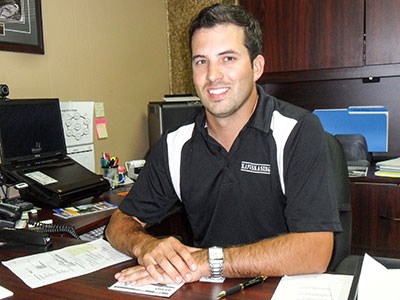A decision five years ago to flag agriculture as a priority sector is paying off in Kapuskasing, and the area is now re-emerging as an agricultural hub in the North.
Last year, the Kapuskasing Economic Development Corporation purchased the federal government’s defunct experimentation farm with an eye to diversifying the local and regional economy, said André Robichaud, Kapuskasing’s economic development officer.
The property has since been remodelled into the Kapuskasing Demonstration Farm and has been a catalyst in reigniting the region’s agricultural and agri-food industry.
“We said it from the get-go: we see this as a regional economic development tool,” Robichaud said. “It’s a tool for the ag sector in the region, and we said we’ve got to operate this farm initially as a working farm, and then the other pieces are going to come together.”
The EDC leased out 90 per cent of the farm, for the next five years, to a producer who’s relocated to Kapuskasing from southern Ontario.
With an anchor tenant in place, the local agricultural community banded together and pooled its money to purchase a cow herd. It’s now in the process of looking for land to house and feed the herd.
It’s a development that came as a bit of a surprise so early on in the business plan.
“I guess our vision is going pretty fast,” Robichaud said. “Some of the things we had in the business plan that were supposed to take place in year three or four have actually taken place in year one.”
Increasing the cow herd, for example, was slated for year three, but is already underway.
“Kapuskasing Meats was born in March of this year, so now they’re selling premium beef and pork in Kapuskasing and in the area, all out of the farm,” Robichaud said.
“The first product offering in March, they sold out of the beef in 10 days.”
At this time last year, the farm had no animals, but this year it’s home to 1,000 animals.
Now that a producer is anchoring farm operations, supplementary projects like crop trials are underway. A corn grazing trial will test seeds from a seed company looking to get into the Northern Ontario market, and, in deference to the emerging craft-brewing industry, hops are being grown in a trial as well.
Strawberry plants have been planted, with a producer considering setting up a pick-your-own strawberry farm in the future.
Kapuskasing has been a growing hot spot for producers migrating up from southern Ontario, and Robichaud believes that will be a continuing trend over the short term.
In some cases, young farmers are wanting to get into agriculture for the first time, while others are part of a family succession plan that’s had to be reconsidered because of the high price of land in southern Ontario.
North of Toronto in Dufferin County, for example, farmers may pay $3 million to $4 million for a 100-acre farm, Robichaud said.
“I don’t think any young farmer’s in a position to purchase those farms, so now they’re looking north,” he said. “You can buy land that’s ready to be cultivated, or it’s ready to produce. You may be looking at $2,000 an acre as opposed to $10,000, $15,000 or $20,000 an acre.”
Kapuskasing was being considered by a Mennonite family looking to relocate north, but ultimately the land package offered by the area wasn’t quite big enough.
The family, which eventually settled in Matheson, east of Timmins, is now farming about 10,000 acres of land.
Next up, Kapuskasing will play host to an agricultural symposium from March 30 to 31, 2017, being held in conjunction with the Northeast Community Network, during which local producers will have a chance to gather and share best practices from the industry.
The first event, held in 2013, attracted close to 200 participants, and the network is hoping to see those numbers grow.
Robichaud said the local food movement has had a big influence on the increase in agriculture in the area. People want to know where their food comes from and are more willing to support local producers.
“For us, as economic developers, we see it obviously as an opportunity, but as a sector that’s very sustainable and stable,” Robichaud said. “Everybody’s gotta eat.”




